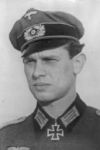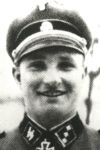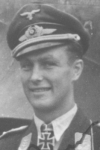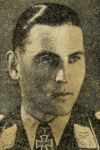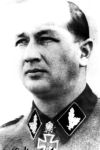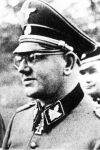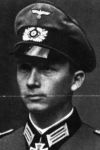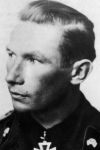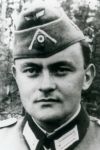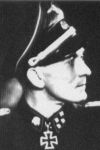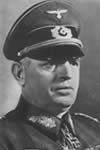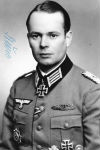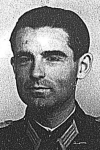Demjanskschild
The Demjansk Shield was instituted on 25 April 1943, to award the defenders of the Demjansk pocket of 1942.
Demjansk was a small city southwest of Lake Illmen in northern Russia. In this city was the German 2nd Army Corps surrounded by the Russian Army during the Russian winter offensive of 1941/1942. The surrounded 2nd Army Corps included the 12th, 30th, 32nd, 223rd and 290th Infantry Divisions and the 3rd SS-‘Totenkopf’ Division. There were also some Police, Reicharbeitsdienst (RAD) and organisation Todt units present. All these forces together totalled around 100.000 men and their commander was General der Infanterie Walter Graf Brockdorff-Ahlefeldt. The encirclement of the city was on 8-2-1942 a fact and this encirclement was not broken until 21-4-1942. On 21 April the 2nd Army Corps broke out of the pocket but the fighting in the area continued until mid-October of that year. As a result of the stiff German resistance and especially that of the battle groups ‘Eicke’ and ‘Simon’ of the 3rd SS-Totenkopf Division, the Germans tied down 18 Russians divisions and some brigades at this part of the front, despite these troops were desperately needed elsewhere on the frontline. The German troops were supplied through the air, this is the reason that there is an aeroplane placed in the design of the shield. Of the 100.000 German troops there were 3.335 men killed and about 10.000 wounded. General der Infanterie Walter Graf Brockdorff-Ahlefeldt returned as a broken man from the pocket and he died on 9-5-1943. For his outstanding leadership in commanding his elite troops was the commandant of the 3rd SS-Totenkopf Division, SS-Obergruppenführer Theodor Eicke rewarded with the Oak Leaves to the Knight’s Cross of the Iron Cross. He was the 88th recipient.
The Demjansk Shield was first produced in silver-washed and later in plain zinc. The shield has a slightly concave shape and a hollow backside. The top of the shield shows the typical Wehrmacht eagle with folded wings, that is clutching a wreath of laurel leaves in its claws. In the centre of this wreath is a mobile swastika placed. Left and right of the wreath stands a bunker with a gun port in the middle. The bunkers are made from tree trunks. The image on the award is separated in two parts by a long box with the text DEMJANSK in it. Underneath this box becomes the shield with a pointed bottom and slightly cutback shoulders. In the upper part of the shield is a single-engine observation plane, with under this plane 2 large crossways placed military swords. Underneath these swords, in the point of the shield stand the year 1942. There are 2 versions of the twin-bladed propeller. The first version has straight blades and the second version shows these blades as curved. At the backside is a supporting plate mounted with 4 pins and between these 2 parts is a piece of cloth placed. The colour of this piece of cloth depends on, in which Army branch the recipient served. This could be the Wehrmacht of the Luftwaffe. The shape of this piece of cloth is oval and significant larger then the shield, so it could be sewed to the left sleeve of the uniform. The supporting plate with the pins was covered with a piece of red brown coloured paper or a piece of cloth. This was to protect the uniform from the pins. It was for the recipient also possible to buy a (9mm) stickpin of this award. This stickpin could be worn on the civilian tunic.
This shield is approximately 100.000 times awarded. The shield was awarded in name of General der Infanterie Walter Graf Brockdorff-Ahlefeldt and with the shield came a standard award document. The awarding was also noted in the Soldbuch. The shield was permanently worn on the left sleeve of the uniform and because of this there were multiple examples given to the recipient. It was also possible for the recipient to buy later new shields, this could in the official controlled LDO outlets. When the recipient owned multiple campaign shields, these could be worn underneath each other with 5mm space between them.
The criteria for receiving this shield were:
Wehrmacht:
- That the recipient served for 60 days in the garrison during the encirclement.
- That the recipient was wounded in the Demjansk pocket.
- That the recipient was awarded a bravery award while serving in the garrison.
Luftwaffe:
- That the recipient had flown 50 combat missions over the pocket or over the surrounding area.
- That the recipient had flown and landed 50 supply missions into the pocket.
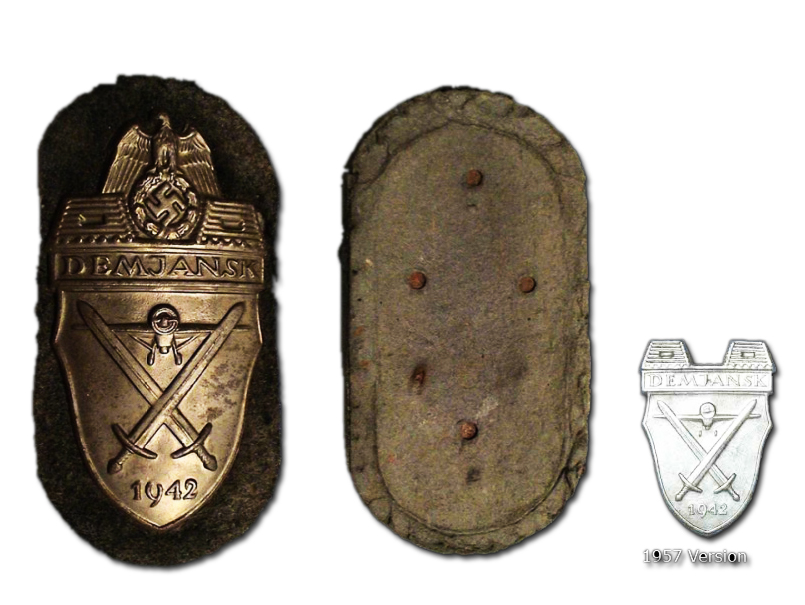
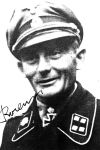
† June 8th, 1973
Plot: II Row: 4 Grave: 11/12





 more
moreSources
- Photo: Darrell S. collection
- - Ailsby C., World War 2 German medals, Ian Allen Publishing, 2003
- Williamson G., World War II German Battle Insignia, Osprey Publishing, USA Edition, 2002.
- Lumsden R., Third Reich Militaria (revised edition), Ian Allan Publishing, Herham, 2003.
- Wehrmacht-awards.com
